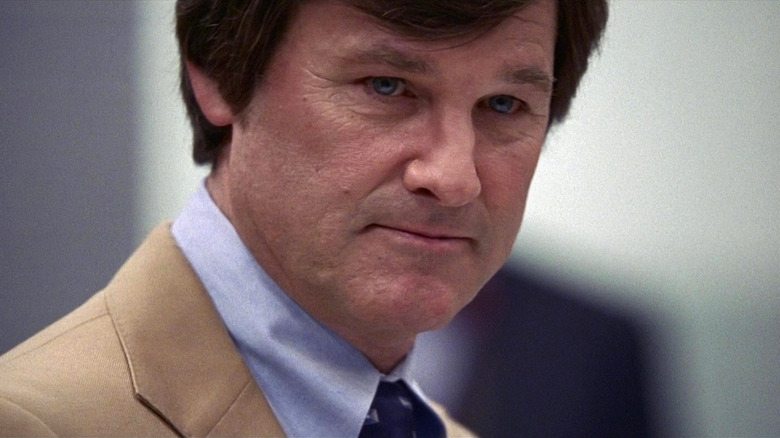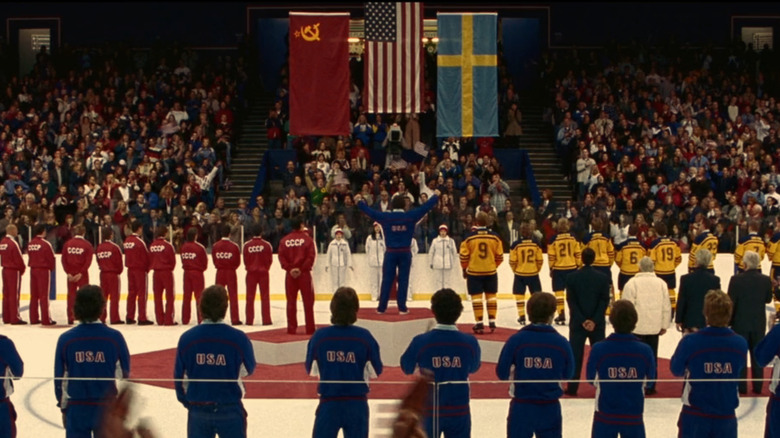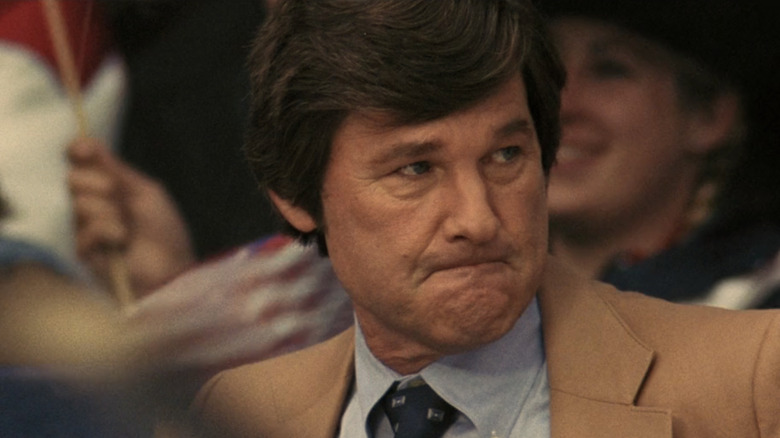How Accurate Is Kurt Russell's Miracle Movie?
One of the great universal truths is that dads love sports movies. Another is that they love Kurt Russell. So, when it comes to the 2004 movie "Miracle," about the "Miracle on Ice" hockey game at the 1980 Winter Olympics, which saw the underdog U.S. team defeat the much more experienced Soviets, there basically is no greater "dad movie." Russell plays University of Minnesota head coach Herb Brooks, who became the head coach for the U.S. Olympic team. He's a titan of not just hockey history but sports history, and "Miracle" is a two-hour testament to his greatest moments. But how accurate is it, really?
The real-life Miracle on Ice was already pretty spectacular and tailor-made for dramatization, with the team falling behind in the second period and coming back in the third to tie things up and then win the game, but the filmmakers behind "Miracle" had to make some changes for storytelling reasons. Every movie "based on a true story" has to have some elements of fiction, of course, but with a story as incredible as what happens in "Miracle," one would hope there wouldn't be too much meddling. Let's take a look!
Miracle was pretty accurate
The main thrust of "Miracle" is all completely accurate, following the scrappy U.S. team of mostly college players and their charismatic coach as they took on the four-time gold medal-winning Soviet team. 1980 was still at the height of the Cold War, when the U.S. and the U.S.S.R. were locked in bitter hatred, so a U.S. victory on American soil was a very big deal. The U.S. would go on to win the gold in the final game against Finland, with the U.S.S.R. taking home silver, but the game between them became the stuff of legend. There are a few changes for dramatic purposes, mostly moving around the dates of college games and seasons in order to create a more cohesive backstory for the rivalries between some of the U.S. players, but it's all pretty minor. Besides, while "Miracle" is ostensibly about the miraculous game, it's honestly more focused on Brooks and his impact on the team and their surprising rise to victory. So, how close is Russell to the Hockey Hall of Fame coach and two-time Olympic medalist?
Russell's ability to channel Brooks has been confirmed by both the original hockey team players and by the production team on "Miracle," who said that he not only embodied the coach onscreen but also took it upon himself to coach the young actors playing the hockey players in acting. He nails Brooks' Minnesota accent and "Minnesota nice," imbuing the character with a very specific kind of kindness known only to Midwesterners. Kurt Russell is a phenomenal actor who always gives 110%, whether he's playing fictional characters or real people, though his biggest moment in "Miracle" is a bit of Hollywood fiction.
The big speech was a bit different
In the film, Russell's Brooks gets to drop a fantastic quote when he tells his team in the locker room: "Great moments are born of great opportunity." He gives an amazing speech, but according to Jack O'Callahan, who played on the actual 1980 U.S. national hockey team, the speech was a mix of fact and fiction. Speaking with WBUR, O'Callahan explained how the scene came to be after he consulted with director Gavin O'Connor:
"So, I wrote that speech out that they actually used in the movie. It wasn't word for word. There were some things in there that were probably what he said and some things that were just me putting my own words in there based on my memories. But when the guys all saw the movie, I actually asked a few guys, 'Is that kinda what he said before the game?' They were like, 'Yeah, pretty much.'"
There wasn't anyone around to record the actual locker room conversation for obvious reasons, so the big moment in "Miracle" is as close to fact as humanly possible. The real Brooks was a consultant on the film as well and helped to ensure accuracy as much as he could, though sadly he died in a car accident six months before the film was released. While small details have been changed in "Miracle," the most important parts are as true to life as can be, and that's a big part of what makes "Miracle" one of the greatest hockey movies of all time.


